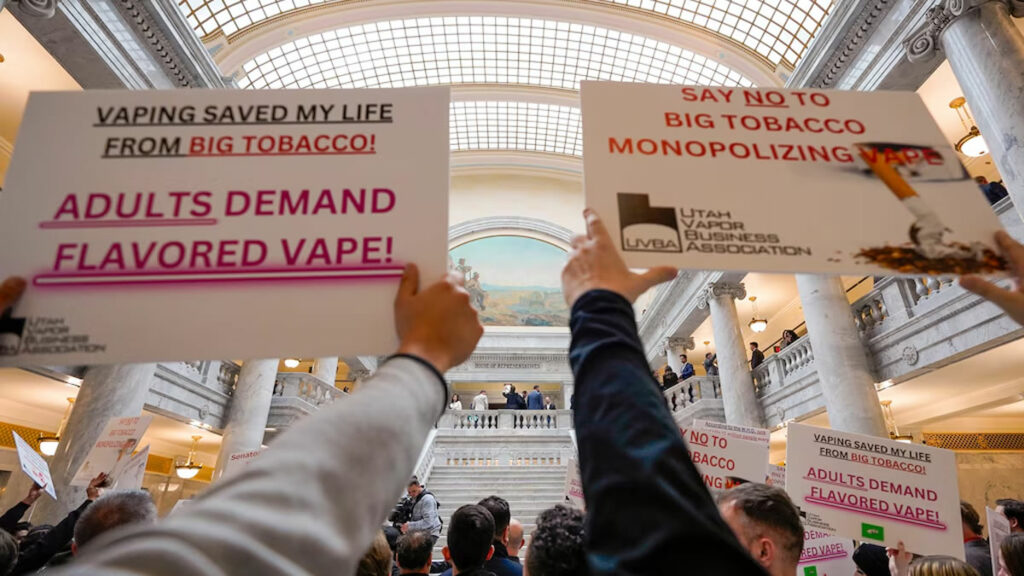A Utah law banning flavored vape juices and products with more than 4% nicotine content has taken effect, leaving only 34 FDA-approved products from six manufacturers legal for sale in the state. The move has vape shop owners fearing for their businesses, with some predicting they will be forced to close their doors.
The ban, passed last year as part of SB61, aims to crack down on flavored vapes and ejuice that lawmakers allege are marketed to young people and lead to youth nicotine use. Despite a legal challenge from the vape industry, U.S. District Judge David Barlow ruled Monday that the ban could take effect, while blocking a provision that allowed for warrantless inspections of vape shops.
Vape Shops Struggle to Survive
Beau Maxon, owner of Park City Vapor and a member of the Utah Vapor Business Association, says the ban will have a devastating impact on his business. “We’re going to try to survive the best we can in hopes of coming back to the table for the ’26 general session, but not being able to sell the product your business is built around, that’s a tall order,” he said.
Tempest Elizondo, manager of Vape Avenue & Smoke Shop in Salt Lake City, echoed these concerns, noting that flavored vape products account for about 50% of the shop’s space and an even larger percentage of sales. “This is how I pay my rent,” Elizondo said. “This is going to affect a lot of small businesses and a lot of family-owned businesses.”
Youth Vaping Concerns and Legislative Efforts
Proponents of the ban argue that it is necessary to protect young people from the dangers of nicotine addiction. According to data from the Utah Department of Health and Human Services, 75% of youth who have used nicotine products first tried a vape, and nearly 70% of those who reported vaping use sweet, flavored juices.
During the recent legislative session, lawmakers attempted to resolve the lawsuit challenging the ban, but were unable to reach a consensus. The Senate proposed removing the inspection provision that Judge Barlow ultimately ruled unconstitutional, while the House sought to undo the ban and implement new regulations for vape sellers. Neither bill passed both chambers before the session ended.
Attorney General Derek Brown praised the court’s decision, saying, “I am thrilled that Utah will now be able to better protect children from the harms of tobacco.”
Uncertain Future for Vape Industry and Enforcement
As the ban takes effect, vape shop owners are left with uncertainty about how the law will be enforced and whether they will be able to sell their current inventory. Maxon said he has asked county health department officials for guidance, but has not received any clear answers.
The Utah Department of Health and Human Services said it is still evaluating the full impact of the ruling on enforcement of the flavor restrictions and nicotine percentages in vaping products.
Sen. Jen Plumb, the sponsor of the vape ban, said the legislative and judicial process worked together to protect young people in this case. “Parents and policy makers need to guard this space and remain vigilant against perennial predators who want to financially benefit by putting children and their health in danger,” she said.
As the vape industry struggles to survive and adapt to the new regulations, the long-term impact on businesses, youth nicotine use, and public health remains to be seen. The debate over balancing the rights of adult consumers with the need to protect young people from the dangers of nicotine addiction is likely to continue in Utah and across the nation.
- UK Announces Mandatory Vape Tax and Duty Stamps from 2027 - February 10, 2026
- Sri Lanka Travel 2026: Total Ban on Cigarettes & Vapes - February 5, 2026
- NY Tax Proposal: Hochul Targets ZYN with 75% Levy - January 29, 2026


